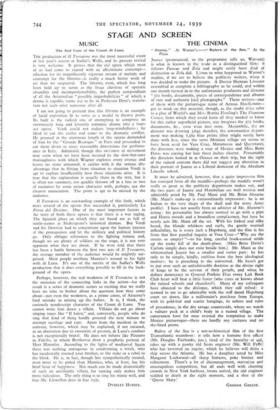THE CINEMA
• Juarez." At Warner's.—" Rulers of the Sea." At the Plaza.
Juarez (pronounced, so the programme tells us, War-ezz) is what is known in the trade as a distinguished film: it follows Pasteur and Zola and might easily have died of distinction as Zola did. Listen to what happened in Warner's studios, if we are to believe the publicity writers, when it was decided to make the picture. A Doctor Herman Lissauer assembled as complete a bibliography as he could, and within one month turned in to the unfortunate producers and director " 372 books, documents, pieces of correspondence and albums of rare and authentic [sic] photographs." Three writers—one of them with the picturesque name of Aeneas MacKenzie— got to work on this material, though, as the credit titles refer to a play of Werfel's and Miss Bertha Harding's The Phantom Crown, from which they could learn all they needed to know for this rather superficial picture, one imagines the 372 books, documents, &c., soon went into store. Meanwhile, the art director was drawing 3,643 sketches, the construction depart- ment was making 7,36o blue prints (they might surely have done with less, since the same Mexican village set seems to have been used for Vera Cruz, Matamoros and Queretaro), the directors were making a tour of Mexico and Miss Bette Davis was cutting her hair three inches shorter. Presumably the directors looked in at Oaxaca on their trip, but the sight of the mined convent there did not suggest any alteration in their portrait of Juarez as a Liberal democrat of the Abraham Lincoln school.
It must be admitted, however, that a quite impressive film has emerged from all the muddle—perhaps the muddle wasn't really as great as the publicity department makes out, and the two parts of Juarez and Maximilian are well written and admirably acted by Mr. Paul Muni and Mr. Brian Ahearne (Mr. Muni's make-up is extraordinarily impressive: he is an Indian to the very shape of the skull and the stony Aztec profile). I have not usually been an admirer of Mr. Ahearne's acting : his personality has always seemed to go with a pipe and Harris tweeds and a boundless complacency, but here he nearly acts Mr. Muni off the set. With his forked and silky beard, the blonde whiskers and curls, the gentle worried inflexibility, he is every inch a Hapsburg, and the film is his from that first puzzled inquiry at Vera Cruz—" Why are the streets so empty? "—to his long, careful frock-coated stride up the rocky hill of the death-place. (Miss Bette Davis's Carlota simply does not exist beside him.) Mr. Muni as the whitewashed Juarez has a smaller and easier part: he has only to be simple, kindly, ruthless from the best ideological motives: he is preaching to the converted. He hasn't got to put over such an unfashionable doctrine as the divine right of kings to be the servant of their people, and when he defines democracy to General Porfirio Diaz every Left Book Club heart will beat a little faster (who cares or knows about the ruined schools and churches?). Many of my colleagues have objected to the dialogue, which they call stilted: it seemed to me to go admirably with the stiff dated Hapsburg court set down, like a millionaire's purchase from Europe, with its gold-leaf and scarlet hangings, its ushers and rules of precedence, in the dry savage countryside, where we watch a vulture peck at a child's body in a ruined village. The cameramen have for once resisted the temptation to make Mexico picturesque—there are hardly any cactuses and no sky-lined peons.
Rulers of the Sea is a not-so-historical film of the first Transatlantic steamboat : it tells how a humane first officer (Mr. Douglas Fairbanks, jun.), tired of the brutality of sail, takes up with a pawky old Scots engineer (Mr. Will Fyffe) who has invented an engine, which he believes will drive a ship across the Atlantic. He has a daughter acted by Miss Margaret Lockwood—all sharp features, poke bonnet and refinement. There's a lot of discouragement, starvation and unscrupulous competition, but all ends well with cheering crowds in New York harbour, lovers united, the old engineer scalded to death at the right moment, and a shot of the Queen Mary.'
GRAHAM GREENE.




































 Previous page
Previous page